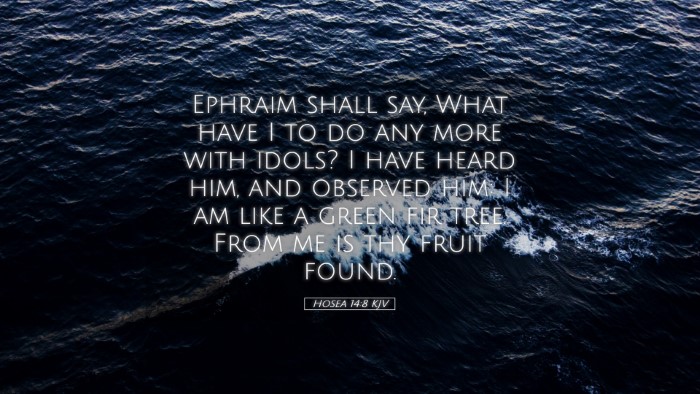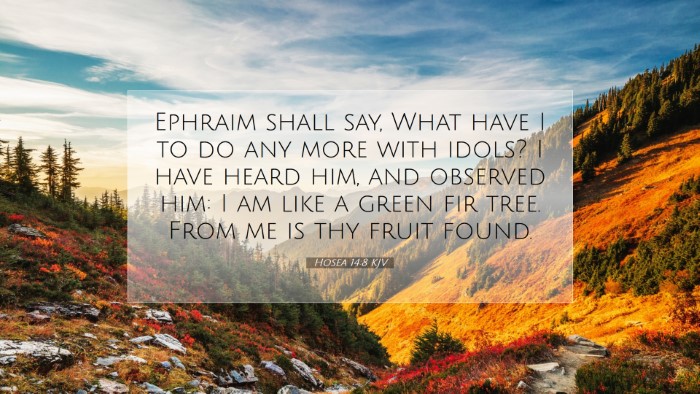Old Testament
Genesis Exodus Leviticus Numbers Deuteronomy Joshua Judges Ruth 1 Samuel 2 Samuel 1 Kings 2 Kings 1 Chronicles 2 Chronicles Ezra Nehemiah Esther Job Psalms Proverbs Ecclesiastes Song of Solomon Isaiah Jeremiah Lamentations Ezekiel Daniel Hosea Joel Amos Obadiah Jonah Micah Nahum Habakkuk Zephaniah Haggai Zechariah MalachiHosea 14:8
Hosea 14:8 KJV
Ephraim shall say, What have I to do any more with idols? I have heard him, and observed him: I am like a green fir tree. From me is thy fruit found.
Hosea 14:8 Bible Commentary
Bible Commentary on Hosea 14:8
Verse: "Ephraim shall say, What have I to do any more with idols? I have heard him, and observed him: I am like a green fir tree. From me is thy fruit found." (Hosea 14:8)
Introduction
This verse concludes the book of Hosea, capturing the essence of Israel's return to God and the elimination of their idolatrous practices. The phraseology in Hosea's writings often oscillates between judgment and mercy, and this particular verse resonates with themes of repentance, divine provision, and the revitalization of spiritual life.
Contextual Overview
The book of Hosea is set against a backdrop of moral decay and spiritual unfaithfulness within Israel. The prophet Hosea, using vivid metaphors and personal experiences, represents God's unwavering love despite His people's constant rebellion. Chapter 14 encapsulates God's invitation to repentance and the promise of restoration for those who return to Him.
Commentary Insights
-
Matthew Henry:
Henry emphasizes the profound transformation that occurs when a believer recognizes the futility of idols. He notes, "Ephraim's confession, 'What have I to do any more with idols?' reflects a sincere acknowledgment of the void that these idols create in their lives." He connects this realization to an overarching theme of renewal, where the believer finds his sustenance in God alone.
-
Albert Barnes:
Barnes elucidates the contrast between the false gods of the past and the true God. He points out that "Ephraim, once entangled in idolatry, now ponders his relationship with these vanities." There is an implicit recognition here that true fulfillment comes from a relationship with God. The phrase "like a green fir tree" suggests vitality and productivity—qualities that stem exclusively from divine connection.
-
Adam Clarke:
Clarke interprets the metaphor of the green fir tree as an indication of spiritual health and fertility. He states, "The believer, when restored, becomes once again a source of fruitful blessing." Clarke further explains that "From me is thy fruit found" signifies that all spiritual fruitfulness originates from the life-giving presence of God. This underscores both the dependency on God and the transformative power of grace in the life of the believer.
Theological Implications
This passage imbues a message of hope and restoration. It reveals key theological principles relevant to pastors and theologians:
- Theological Reflection on Idolatry: The text prompts an evaluation of contemporary 'idols' faced by believers today. This calls for a self-examination regarding reliance on materialism, success, and relationships over faith in God.
- The Nature of True Repentance: Hosea 14:8 serves as a cornerstone for discussing the character of repentance. True repentance is demonstrated through a clear break from idolatry, leading to a renewed devotion to God.
- Divine Mercy and Restoration: The verse reinforces the assurance that God is always ready to forgive and restore. This is crucial for pastoral counseling, encouraging individuals that despite past failures, God's grace is adequate for restoration.
Practical Application
In the light of Hosea 14:8, the church and individual believers are called to:
- Examine their lives for modern-day idols that distract from a full devotion to Christ.
- Engage in sincere repentance that leads to fruitful living which can only be found in a relationship with God.
- Encourage one another in the faith community to seek restoration and healing through the Word and prayer, reminding each other of God's unfailing love and mercy.
Conclusion
Hosea 14:8 encapsulates a powerful message of hope found in the unique relationship between God and His people. As emphasized by public domain commentators, the abandonment of idols leads to renewal and fruitful living in God. This serves as a challenge and encouragement for the church today to align its heart and priorities singularly to the glory of God.


